The enchanting world of parrots and their ability to mimic human speech has long captivated our imagination.
However, when a parrot suddenly stops talking, it can be a source of concern for their caretakers. Parrots are renowned for their intelligence and communication skills, but there are various factors that can contribute to a parrot ceasing its talking.
Understanding Parrot Stopped Talking- the reasons behind this behavior shift is crucial to providing the best care for these charismatic avian companions.
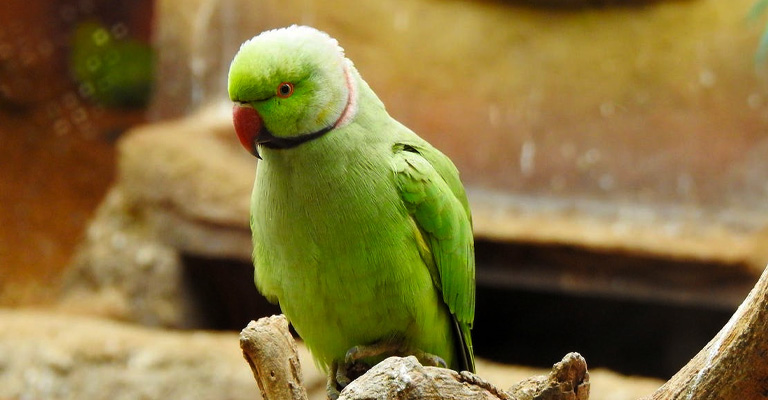
Parrot Stopped Talking- Reasons
There are many possible reasons for this behavior, and I will explain some of them to you:
Illness Or Pain
One of the most common reasons why a parrot may stop talking is that it is sick or injured. Parrots are very sensitive to infections, parasites, injuries, and stress, and they may lose their appetite, energy, and voice when they are unwell.
If you notice any signs of illness or pain in your parrot, such as dull feathers, droopy eyes, loss of weight, or difficulty breathing, you should take it to a vet as soon as possible.
New Surroundings
Another reason why a parrot may stop talking is that it is adjusting to a new environment. Parrots are very territorial, and they may feel insecure or scared when they are moved to a new home or cage.
They may need some time to get used to the new sights, sounds, smells, and people around them before they start talking again.
Fear or Anxiety
Parrots are prey animals, and they have a natural instinct to avoid danger. They may stop talking when they sense a threat or a predator nearby, such as a cat, a dog, or a hawk.
They may also become silent when they hear loud noises or see sudden movements that startle them. Parrots need a calm and safe environment to feel comfortable and vocal.
Boredom or Loneliness
Parrots are social animals, and they need stimulation and interaction to stay happy and healthy. They may stop talking when they are bored or lonely, especially if they are kept alone in a cage for long periods of time.
Parrots need toys, games, puzzles, and other activities to keep their minds and bodies active. They also need companionship from other parrots or humans to satisfy their social needs.
Lack Of Attention Or Training
Parrots learn to talk by imitating the sounds they hear from their owners or other birds.
They may stop talking when they don’t receive enough attention or training from their owners. Parrots need regular and positive reinforcement to maintain their speech skills and motivation.
They also need variety and challenge in their vocabulary and phrases to keep them interested and engaged.
Molting or Breeding
Parrots may stop talking when they are going through natural processes such as molting or breeding. Molting is when parrots shed their old feathers and grow new ones, usually once or twice a year.
Breeding is when parrots mate and lay eggs, usually in the spring or summer. Both processes can affect the hormones and mood of parrots, making them less talkative and more irritable.
Old Age Or Stress
Parrots may stop talking when they are aging or experiencing stress. As parrots get older, they may lose some of their cognitive abilities and memory, making it harder for them to remember words or sounds.
They may also become more quiet and reserved as they age. Stress can also affect the speech of parrots, as it can cause them to lose their appetite, sleep, and confidence.
Change In Diet Or Water
Parrots may stop talking when they have a change in their diet or water quality. Parrots need a balanced and nutritious diet that includes fresh fruits, vegetables, seeds, nuts, pellets, and occasional treats.
They also need clean and fresh water that is free of chlorine, fluoride, or other chemicals. A sudden change in the type or quality of food or water can upset the digestive system and health of parrots, making them less vocal.
Personality Or Preference
Parrots may stop talking simply because of their personality or preference. Some parrots are naturally more talkative than others, depending on their species, gender, temperament, and history.
Some parrots may prefer to make sounds other than words, such as whistles, clicks, beeps, or songs. Some parrots may only talk when they want to communicate something specific, such as hunger, thirst, boredom, or affection.
These are some of the reasons why a parrot may stop talking.
How Can I Encourage My Parrot To Talk?
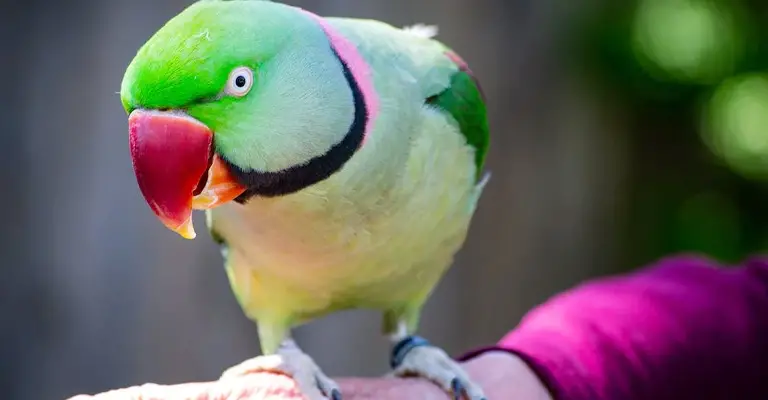
Parrots are amazing animals that can mimic human speech and other sounds, but they need some training and stimulation to develop their vocal skills.
Here are some effective ways to encourage your parrot to talk:
Choose A Talkative Species
Some parrot species are more likely to talk than others, depending on their intelligence, temperament, and history.
African gray parrots, Amazon parrots, cockatoos, and cockatiels are among the best-known talkers, but even small parrots, such as budgies, Quakers, and lovebirds, can learn to speak. If you want a parrot that talks, you should do some research on the different species and their abilities before getting one.
Start Simple And Repeat
The best way to teach your parrot new words is to start with simple words that are easy to pronounce and repeat them often. Words like “hello,” “bye-bye,” “bird,” or your parrot’s name are good examples.
Say them every time you enter or leave the room or when you interact with your parrot. Make sure you say them clearly and with the same tone and inflection each time.
Use Positive Reinforcement
Parrots learn best when they are rewarded for their efforts. You can use treats, toys, praise, or attention to motivate your parrot to talk.
Whenever your parrot says a word correctly or tries to imitate you, give it a reward and show your excitement. This will make your parrot associate talking with something positive and fun.
Associate Words With Meanings
Parrots can learn to understand the meaning of some words and use them appropriately. For example, you can teach your parrot to say “hungry” or “thirsty” when it wants food or water or “pretty bird” when it wants a compliment.
To do this, you need to say the word when you give your parrot what it wants and repeat it until your parrot learns the association.
Provide Stimulation And Interaction
Parrots are social animals, and they need mental and physical stimulation to stay happy and healthy. You can provide your parrot with toys, games, puzzles, music, and other activities to keep it entertained and curious.
You should also spend time with your parrot every day, talking to it, playing with it, or cuddling with it. This will make your parrot feel more comfortable and confident around you and more willing to talk.
Expose Your Parrot To Different Sounds
Parrots can learn to mimic not only human speech but also other sounds that they hear in their environment. You can expose your parrot to different sounds by playing recordings of other birds, animals, or people talking.
You can also let your parrot listen to the radio, TV, or music. This will enrich your parrot’s vocabulary and make it more interested in talking.
Teach Your Parrot Phrases And Songs
Once your parrot has mastered some words, you can move on to teaching it phrases and songs.
You can start by adding more words to the ones your parrot already knows, such as “hello bird” or “bye-bye pretty bird.” You can also teach your parrot parts of your favorite songs by singing them line by line and repeating them until your parrot learns them.
Avoid Stress And Boredom
Parrots may stop talking or become less vocal when they are stressed or bored. Stress can be caused by factors such as illness, injury, noise, predators, or changes in the environment.
Boredom can be caused by a lack of stimulation, interaction, or variety. You should try to avoid these factors as much as possible by providing your parrot with a safe, comfortable, and fun environment.
Be Patient And Consistent
Parrots may take some time to learn how to talk, depending on their species, personality, and interests.
Some may start talking after a few weeks or months of training, while others may take years or never talk at all. You should be patient and consistent with your training and not give up on your parrot.
Even if your parrot doesn’t talk much, it can still be a wonderful companion for you. I hope these ways help you encourage your parrot to talk.
What Is The Easiest Parrot To Teach To Talk?
Parrots are amazing animals that can mimic human speech and other sounds, but some parrots are more likely to talk than others, depending on their intelligence, temperament, and history.
Here are some of the easiest parrots to teach to talk:
African Grey Parrots
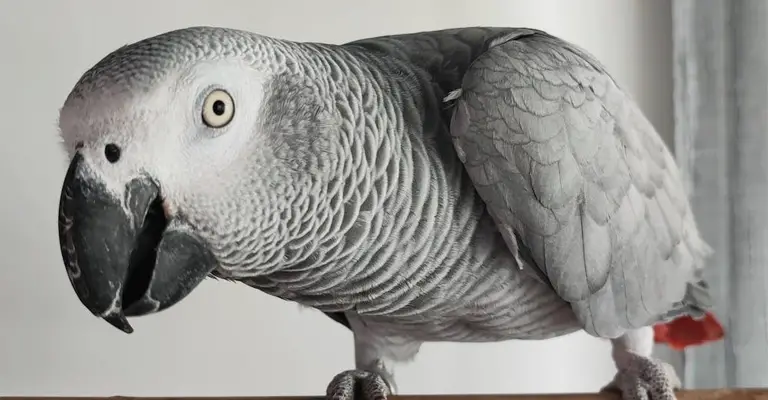
These are widely considered the best talkers among parrots, as they have a large vocabulary, a clear voice, and a remarkable ability to understand and use words in context.
They can also imitate other sounds, such as whistles, beeps, or animal noises. They are very intelligent and sensitive birds that need a lot of attention and stimulation.
Amazon Parrots
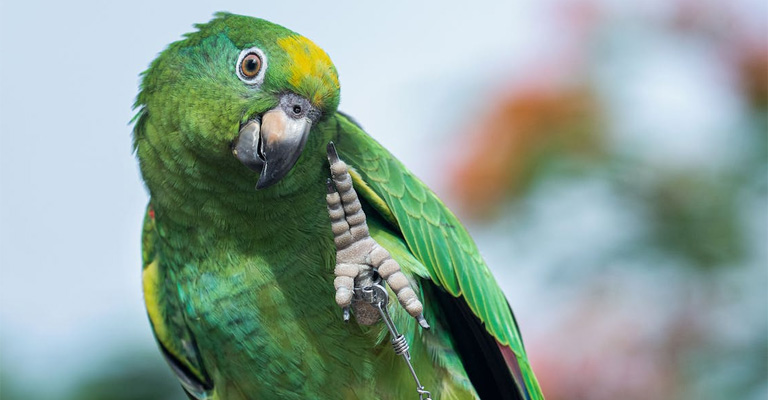
These are also very talented talkers, as they have a loud and expressive voice, a good memory, and a playful personality.
They can learn words, phrases, songs, and even whole conversations. They are very social and affectionate birds that enjoy interacting with their owners.
Budgies
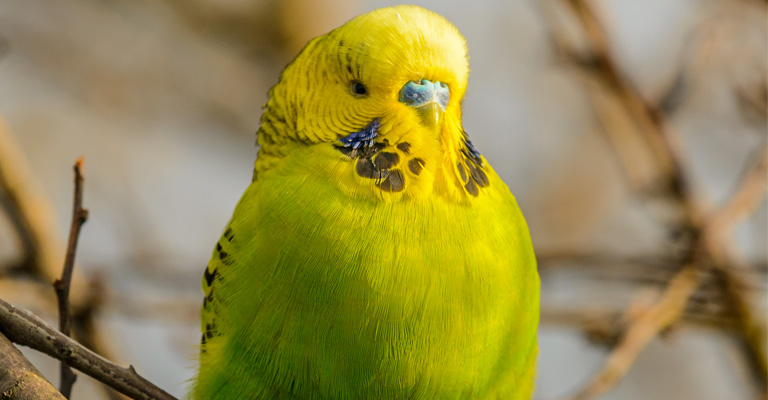
These are the most popular and common pet parrots in the world, and they can also be very good talkers.
They have a high-pitched and fast voice, and they can learn hundreds of words and sentences. They are very curious and active birds that need a lot of toys and activities.
Cockatoos
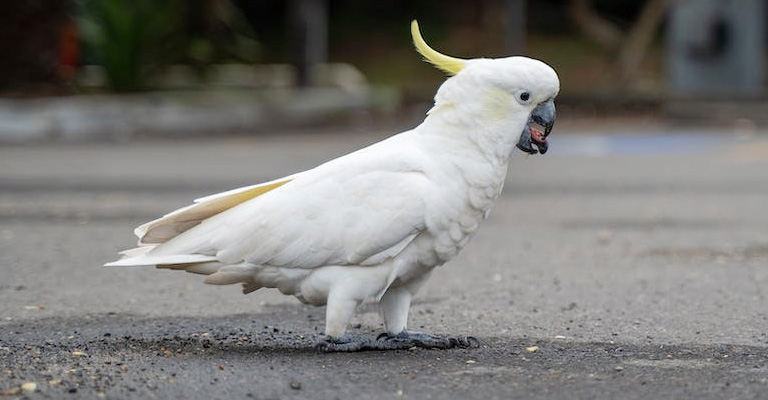
These are large and beautiful parrots that can also be very vocal. They have a loud and raspy voice, and they can learn words, phrases, songs, and even swear words. They are very loyal and affectionate birds that need a lot of attention and cuddles.
Cockatiels
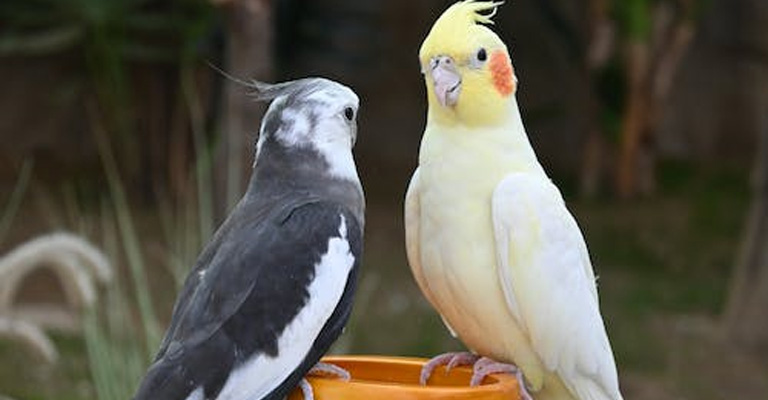
These are small and cute parrots that can also be very talkative. They have a soft and whistling voice, and they can learn words, phrases, songs, and even phone rings. They are very friendly and gentle birds that love to be petted and scratched.
Eclectus Parrots
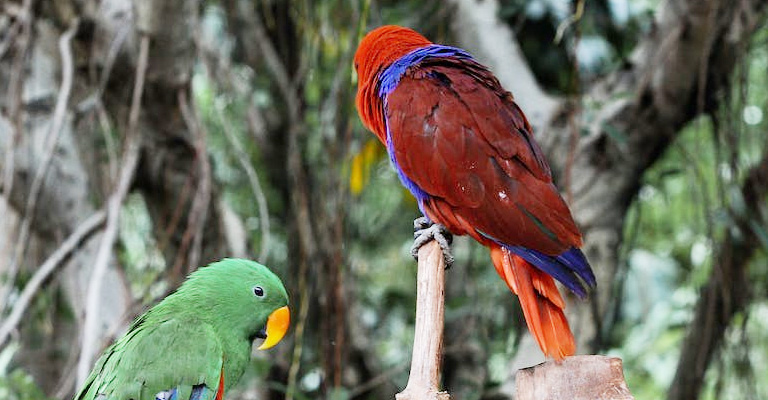
These are colorful and elegant parrots that can also be very vocal. They have a clear and sweet voice, and they can learn words, phrases, songs, and even jokes. They are very intelligent and calm birds that need a balanced diet and a spacious cage.
Indian Ringnecks:
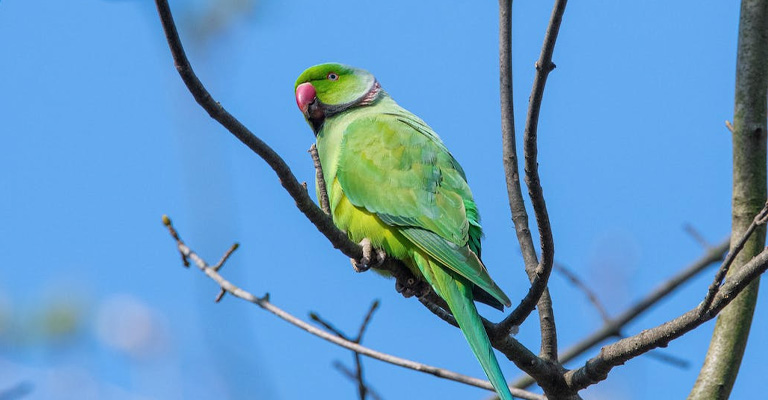
These are medium-sized and attractive parrots that can also be very vocal. They have a loud and squeaky voice, and they can learn words, phrases, songs and even mimic other birds.
They are very smart and independent birds that need a lot of toys and challenges.
Macaws
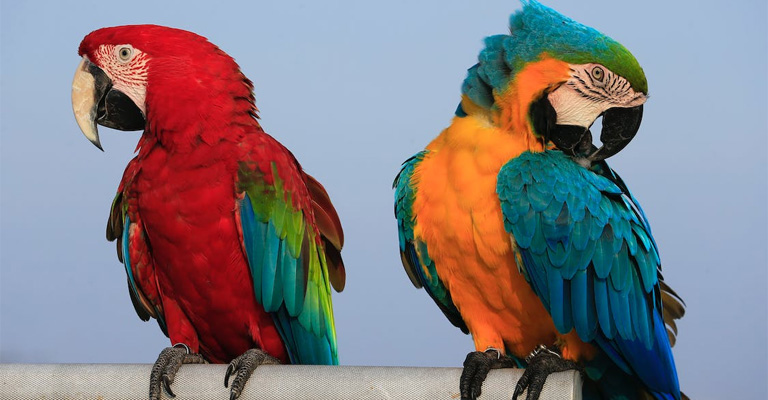
These are the largest and most colorful parrots in the world, and they can also be very vocal. They have a loud and harsh voice, and they can learn words, phrases, songs and even imitate human laughter. They are very playful and charismatic birds that need a lot of space and exercise.
Quaker Parrots
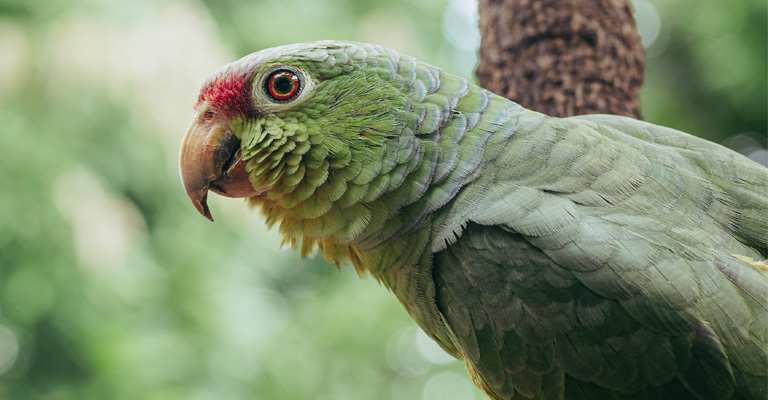
These are small and green parrots that can also be very vocal. They have a low-pitched and raspy voice, and they can learn words, phrases, songs, and even count numbers.
They are very social and territorial birds that need a lot of interaction and companionship.
These are some of the easiest parrots to teach to talk, but there are many more possibilities depending on the species, personality, and interest of your parrot.
The best way to teach your parrot new words is to use repetition, association, positive reinforcement, and patience.
FAQ
Parrots may stop talking due to changes in their environment, stress, or health issues. Sometimes, they go through silent phases that are part of their natural behavior.
Yes, sudden loss of speech could signal health issues such as respiratory infections or other illnesses. It’s essential to monitor your parrot’s overall behavior and consult a veterinarian if you’re concerned.
Yes, changes in their surroundings, such as a move to a new home or rearrangement of their cage, can lead to stress and a temporary pause in talking.
Parrots are intelligent and can get bored with repetition. They might take breaks from talking if they’re not receiving enough mental and physical stimulation.
Spend quality time with your parrot, provide engaging toys, and create a positive environment. Patiently reinforce their talking behavior with treats and praise.
If the silence persists, consult a veterinarian to rule out any underlying health issues.
Conclusion
In the realm of parrot companionship, the cessation of talking can be attributed to a range of factors, from changes in the environment to health issues or simply shifts in the parrot’s preferences.
It’s important for caretakers to approach this change with patience and an observant eye. Engaging in positive interactions, providing mental and physical stimulation, and seeking professional advice when necessary can help address the reasons behind a parrot’s silence.
Remember, just as with humans, parrots have their unique personalities and moods, and their communication patterns may ebb and flow in response to the complexities of their lives.